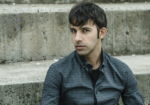
I (Doug Perkins) first became aware of the jazz guitar phenomenon known as Dario Chiazzolino (the non-Italian pronunciation being “Chee-as-o-LEEN-oâ€) from some videos he posted in a Facebook jazz group. His video on “All The Things You Are†showed a very advanced understanding of harmony and a sort of Bach-like ability to control his improvisations on a multi-level basis, with lots of really hip reharmonizations. That led me to some videos of him playing with Yellowjackets, which floored me showing a very high level of musical maturity for a very young man – he’s currently 33, but played with them in his 20s.
I arranged to meet with him at the NAMM Show a couple of years ago when he was a featured performer in the Mark Bass booth, and we started talking about him doing a masterclass for JazzGuitarSociety.com I found him to be an extremely intelligent and deep guy, who is very intense while possessing a gentle nature. We met up again this year, with the new year adding a D’Angelico endorsement for him. It was pretty clear that it was time to get him into the JGS artist fold. I connected with him from his New York City apartment on Sunday Feb. 4th, 2018 on Skype for this interview.
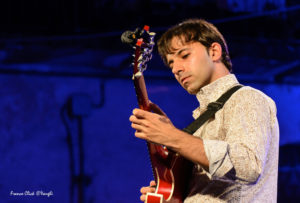
DP: Let’s start out with where you were born?
DC: I was born in Turin, Italy – the northwest part of Italy.
DP: My first thing that I always want to know from everyone that I interview is “what was the path that led you to the guitar in the first place�
DC: I didn’t have any idea about {anything about playing} the guitar, all I knew was that I wanted to play the guitar. So I expressed my desire to my parents when I was 10-11 years old, and they got me a guitar as a Christmas present when I was eleven years old. And after that actually I started playing the guitar like all day long, immediately, even though I didn’t know ANYTHING about how to play the guitar.… (both laugh)…it was a toy, you understand?
DP: I understand – what kind of guitar was that?
DC: It was probably one of those super cheap Chinese guitars, a classical guitar with no amplification. So I found inside that there was a book with guitar chords in it, so I started learning the chords from the map – all the major and minor chords that any young guitar player can study, C major and A minor and all the super easy things.
DP: So what were you listening to at that point? You said it wasn’t anything in particular, but something must have caught your attention.
DC: Yeah, yeah, yeah – at that time, actually, I was listening to rock music – progressive rock. So my first exposure to music was you know, all the greatest rock guitarists – all the guitar heroes starting from Jimi Hendrix to AC/DC to Led Zeppelin, Deep Purple, Queen….and I can mention a few progressive rock names like Dream Theatre. I was attracted to the sound of the rock guitar – with distortion, with a certain virtuosity, I guess like most guitar players. Actually, it’s exciting to think of when I started playing guitar, because of course, I didn’t know anything about that – no background, nothing, and just like an animal, right? Looking for something from an instrument and trying to create a sound – that’s how I started.
DP: So you eventually moved into electric guitar after classical?
DC: Yes, it took me about three years – I didn’t have a mentor or any specific teacher, I just got some lessons from different teachers playing the classical guitar. And then when I was 14 I got my first electric guitar, it was a Yamaha Pacifica.
DP: So as far as the classical thing goes, did you learn rest strokes and free strokes and play like the Villa Lobos literature and that kind of stuff?
DC: Yeah. I don’t remember the name of the book, but it was all about how to play properly with the fingers of my right hand…it was more open strings and melodies and stuff. It was the first book that I started with, and was like a classical guitar book.
DP: So then you got your electric guitar, and then did you look for a teacher then, or what did you do?
DC: Yes, actually I took some lessons from a teacher living in my hometown of Turin. So I took actually just like five lessons from him, and he recommended to me to study 3-4 very important electric guitar methods, including the Frank Gambale, John Petrucchi, and Troy Setina methods. Most of them were just licks and things to develop your speed with your left and right hands. It was a combination of study on sweep picking, legato, tapping with one finger and more fingers, all the heavy metal techniques basically.
DP: How old were you then?
DC: Fourteen.
DP: At 14 your teacher recommended that you get a Frank Gambale book! You must have been pretty good for your age, wow! (both laugh)
DC: Like I said before, I didn’t know anything so everything that I did sounded kind of normal to me, but afterwards it was kind of…ahhh…not premature, but something like that. I started very early, but of course at the same time I was playing with some bands – rock bands. Actually, when I was 14 I started playing professionally – after three years I got my first engagement, and that helped me to think about music very seriously. Yeah, so other than playing soccer and going to school, I was playing the guitar all of the time. It was something crazy for me, like love at first sight, you see just the guitar and nothing else.
DP: I think that pretty much everybody that does what you’ve done what you’ve done and has gone down that path is like that. So did you go to music school or did you just do everything on your own after that?
DC: I did everything by myself, but after high school I went to the Conservatory to study Jazz, but I didn’t get any lessons because it was a college course, but not a guitar course. So I went there studying music ensemble, compositions, arrangements….and I have to say that course helped me a lot to write music – the process of writing music and arranging music – but the guitar, it was by myself because there was no guitar teacher there at the time. There was only one player, a double bass player, teaching students how to deal with a band. Basically, it was teaching students how to play with a band and how to write music and how to deal with different situations.
DP: And what school was this?
DC: It was like the Turin Conservatory of Music. In Italy we only have the Conservatory as the the main important school of music, we don’t have any college but the conservatory is like going to the college here in the states. But I have to say that if I compare this studio to like Berklee or Juilliard, it’s like almost nothing, the Berklee and Juilliard programs are much more extensive.
DP: At what point did you decide that you wanted to be a jazz player?
DC: Yeah – that’s a good question. I was probably like 15 years old and I was kind of bored of playing all the rock licks, the rock phrasing – and I was looking for something more interesting to me…and I was looking for something more interesting to me, more complicated. So at some point I discovered Charlie Parker, so at some point I started listening to all of his records. And I realized that is was just the beginning for me – I was looking for something, for a language, and jazz at that moment was the answer. And listening to him, I could figure out how to expand my musical horizons, in terms of harmony and you know, phrasing, and the way that I needed to play was with the harmony and not just scales or melodies or something like that. And after I started studying Charlie Parker I started studying all the arpeggios, you know, and a big door actually opened. And from that moment I really studied how to play inside a chord, inside a harmony, inside a specie key.
DP: Did you make up all of your own arpeggio fingerings, or did you get them somewhere?
DC: I did both actually, When I was 15 I didn’t have any computer at the time – no Internet, nothing – I didn’t get a computer until I was 17 years old. So actually, I did it myself in the first period. So after I got my first computer I could go on the internet and find some information, so at that point I could go and find information that was actually complimentary to my material. So at that point, I combined the two things: the information that I knew, and the information that I got.
DP: And now you’re thirty two – amazing. So what was the first jazz guitar player that you heard that made you say, “wow, I like this guyâ€?
DC: Yeah, Joe Pass!! Actually, Joe Pass and Wes Montgomery probably at the same time, but Joe Pass for some reason impressed me like crazy! I was impressed how he played solo guitar versions of all the standards, and he was a mentor for me, for sure! Even now, I like to go to YouTube and watch his videos – still great, amazing! And of course, Wes Montgomery, for me is probably like the main jazz guitar player, even now. Because his phrasing is so pure – and at the same time, there is no frills, just the real language. And from listening to him, you can build your own language. Listening to him is more important than listening to all the young musicians like Pat Metheny, John Scofield, you know, because he is more…you can get more of the language just listening to him. And as I said before, there is no frills, just the language, with melody, rhythm – there is everything, you know?
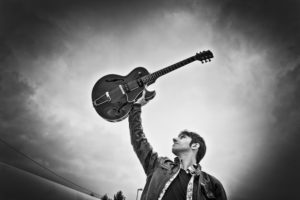
DP: So you went to this Conservatory where you had to half way teach yourself, and did you graduate from that school?
DC: Yeah, I did the Bachelor of Music there.
DP: And that was a 4 year school?
DC: It’s a 5 year school.
DP: So now you’re out of school, and then what? You were out of school and now it’s time to start working – but of course you never stopped, you were always doing gigs through college, right?
DC: Yes, I gigged the whole time, but I started {college} when I was 20, so those five years until I was 25 were super-intense for me, because I was playing with all the musician in my home town, and some of the greatest jazz musicians living in Italy. Basically, that segment of time was the most important for me because I was still learning how to deal with musicians in a band, and at the same time developing my phrasing, my dexterity, and my musical personality. And at the same time, I was playing with musicians older than me. Playing with them was probably the most effective experience that I had in my life – hearing them and figuring out how to deal with different problems like different repertoires, something you don’t know but you need to pretend that you know the song when you are on stage – you know, you learn all the tricks and how to deal with music situations.
DP: One of the first things I saw from you was your “All The Things You Are†solo guitar video, which was unbelievable, just flawless execution in both ands and totally hip musically: https://www.youtube.com/watch?time_continue=8&v=-T2lZbm28UY But then I saw the Yellowjackets stuff ( https://www.youtube.com/watch?time_continue=17&v=VJlfEp7otJg ) – so what happened that got you into doing things like that?
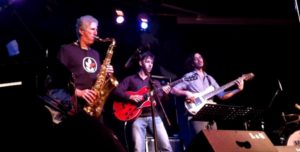
DC: Well, the collaboration with the Yellowjackets happened because I made a record with some of them: Bob Mintzer, Russel Ferrante, and Jimmy Haslip. We did a record in Los Angeles in 2012, because there was an Italian producer that wanted me to play with them, but to play MY music with them. He brought me to Los Angeles and we recorded an album consisting of all of my compositions. That I actually composed for that specific situation and arranged for those members. And it was actually the coolest experiences of my life playing with them. So after recording with them I was actually called to play with them on what was the “Time Line†tour, so I had to study all of the repertoire. Actually, part of the repertoire I knew before, because I am huge fan of the Yellowjackets, even before I played with them. And when I got on stage with them, I remember it was like a moment of joy and extreme satisfaction. I realized that the greater the musicians are, the easier it is because they can really support you by their excellent abilities.
DP: Right – and you’re not going to get a nicer guy than Russell Ferrante, either! (both laugh)
DC: Yeah, so sweet!
DP: So how long did you have to learn all of that music before you had to go out on tour?
DC: It was actually a fast process because I was super excited and was looking forward to playing the music, and it took me a few days to really master all the compositions – all the music. And of course once you get the music, once you get the confidence, you can really play. But I would say that probably I only had to study just eight new songs, because all the other compositions I already knew. But at that moment, “Time Line†(Yellowjackets record that the tour was supporting, the record includes Robben Ford, so they needed a guitar player for the tour) was new.
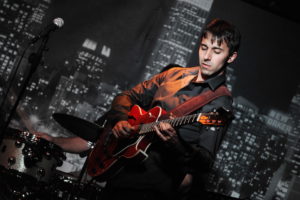
DP: Tell me about the tours you have coming up – I want to find out about all you are doing musically and who you’re playing with.
DC: I have some new things coming up, one of them is a band called “Spirit Fingers†the band is made up of great musicians including Greg Spero on the piano, Hadrien Feraud on the bass, and Mike Mitchell on the drums It’s a quartet, and in this situation, I play the nylon string guitar. I’ve always played the nylon string but in this situation it’s kind of weird, because the music is progressive jazz, and so there is lots of odd meter, and the drummer comes from progressive rock music, and the nylon string guitar is noted for being soft, but in this situation I had to make it WORK, so even though we play loud music, it’s cool because it’s an original sound. It’s interesting, it’s a very nice music situation.
DP: What guitar do you use in that band?
DC: I started wth an Alhambra ( http://www.alhambrausa.com/ ), but because of the feedback, I had to change to a Godin ( http://www.godinguitars.com/ ), with Dogal strings ( https://www.dogalstrings.it/en/ ) , they are incredible.
DP: What would you say this band sounds like – is it like Oregon?
DC: Sort of – if I had to describe it, it’s something like modern jazz, new age, word music, and I don’t know, something futuristic. It’s a very cool band, and improvising is probably like 50% of the game. It’s all odd meter, there is no 4/4 ever.
DP: Where all are you touring?
DC: We’re going to start in New York and Chicago, and then will be in Los Angeles, Atlanta and Indianapolis. So the US tour is coming up in March and the in the fall we will be in Europe, Japan and Asia. So we start with the US tour and then after a few months we will be over there.
DP: Is there already a record, or will you record after you’ve toured a bit?
DP: Yes, there is a record and it will be released on March 16. (Take a look at this super-group line up: https://www.propermusic.com/product-details/Spirit-Fingers-Spirit-Fingers-253133 ).
DP: I know you live right in New York City – who do you play with in New York, and where do you play?
DC: I do a lot of local gigs here like The Bar Next Door, the FatCat, Small’s Jazz Club, Jazz At Lincoln Center and places like that. I always play with New York musicians, to give you and example, Francisco Mela is a Cuban drummer living in New York ( http://ayvamusica.com/team/francisco-mela/ ), and Marco Panascia (http://marcopanascia.com/ ) is a double bass player from Italy living in New York. Taylor Eigesti on the piano ( http://www.tayjazz.com/ ), Willie Jones III on the drums ( http://www.williejones3.com/bio.html ), and Rob Garcia on the drums ( http://www.robgarciamusic.com/about.php ). Most of the time I play in trios, I play my compositions and standards.
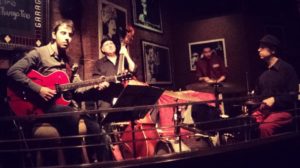
DP: What’s your live rig? Do you use any effects, or is it just guitar/amp/cord?
DC: It depends, but when I want to play my music, it’s a clean sound with a little bit of reverb and delay, but almost nothing, the sound basically comes from the guitar.Sometimes I like to have some boost, a pedal, just to have more body – not to have distortion, but just to have a little bit of overdrive. It helps you to have more legato and sustain – I like it, actually.
DP: Philosophically speaking, what would you say are the three most important things that you want to have present in your playing? What’s the overriding thing that you are looking to do musically when you go out and play?
DC: (Laughs) Well, when I play, the most important thing is to be driven by music – to be guided by the music itself. Thats the most important thing. Then, playing who I am – I have my own language and I have to respect it anytime I play in front of an audience. And then the third thing is listening. It’s not the right order and probably you can mix it, but these three things are super important to me. Playing what I really know and what comes from my repertoire, my language – listening to what is happening around me, and of course, always being guided by the music.
DP< So this is sort of the inverse of that question: we all have things that are challenges for us, what are the things that you feel you still have to work on?
DC: That’s a good question! (both laugh) Yeah….what I am always working on is to have a certain endurance when I improvise. My life’s goal is to be able to do like a never ending solo…without repetition. I want to be able to play breathless with no break and just always new ideas, to be able to make a conversation without using the same stuff. So I think that a good challenge is to be able to always respect this principle, to play a solo that is 100% original – it’s kind of hard….every musician has their own way of playing and way of doing things, but yeah, it’s kind of hard…
DP: That is the sort of “lost chord†sort of thing that we are all chasing after (laughs). OK, just a couple more things: what would you say your career goals are now? Do you have certain things like “I want to do this after this tour†or whatever?
DC: Yeah – I’m working on a solo album now, just me and my guitar, like what you heard with the “All The Things You Are†video – I’ve been working on a repertoire like that. And I have another album coming up in a couple of months with some Italian musicians, an organ trio – guitar, drums and organ. The album is going to be out in a couple of months and we will have a tour in the summer times. And actually, there is a potential tour with Randy Brecker coming it – it’s not locked yet, but it will happen around the end of March, an Italian tour with some Italian and some American musicians.
DP: I’d love to see that happen for you, that would be great. Where can people get your music?
DC: People can go to Apple and Amazon and Spotify, but also my personal site:
DP: And to close, what else would like people to know about you that I didn’t cover?
DC: Yeah, actually what I have been doing work toward a community of guitarists through a personal space on my website, where I can actually hang out with guitar players.
DP: Like a chat room?
DC: Yeah, like a chat room actually, where we can talk about music. Not just lessons, but advice of guitar players, very easy things to discuss without actually seeing each other. And of course, I’m going to be able to tell about my career and and my shows and concerts, so it’s going to be like a good way to be close to people following my career, and it’s a good chance to hang out with them and become like close friends.